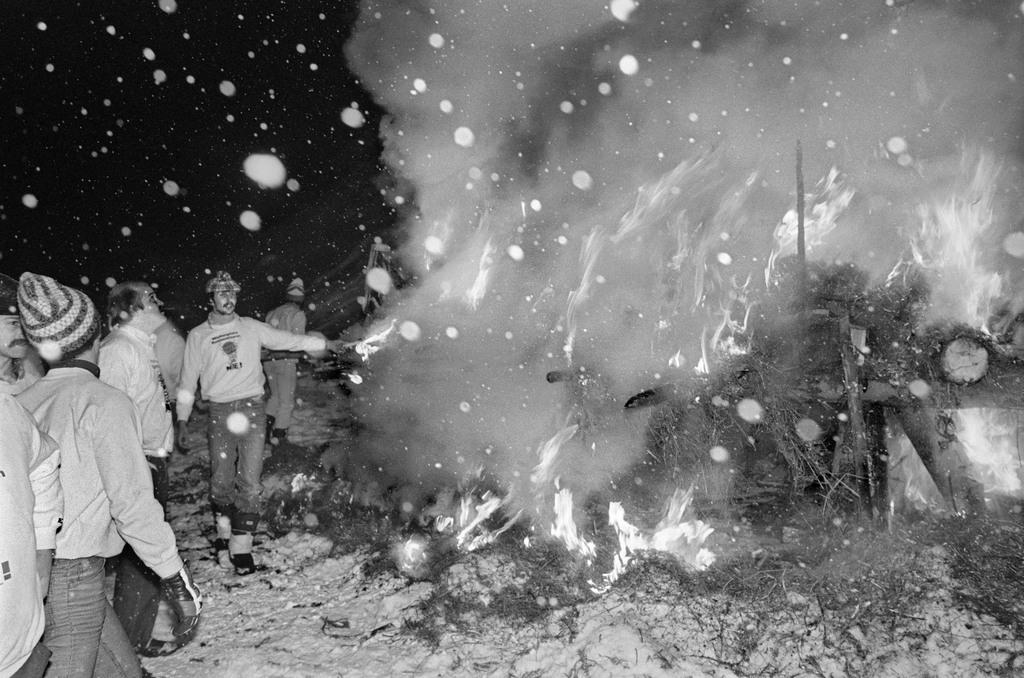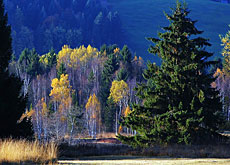When an unusual alliance made Swiss voting history

Thirty years ago, voters caused a huge political upset when they backed an initiative to protect Swiss moorlands, thus rejecting government plans to build an army training ground. It marked the beginning of a series of successful ballot box decisions on environmental issues.
The result of the nationwide vote on December 6, 1987 took both opponents and supporters by surprise.
That day, 58% of voters supported the idea of moorland protection after several years of heated debate and bitter divisions among residents over 100 hectares of moorland and heath in the Biber Valley in central Switzerland. The shrubland area, 35km (20 miles) south of Zurich, is Switzerland’s largest upland moor.
“It dealt a double blow to the political establishment,” says political scientist Michael Hermann from the Sotomo research instituteExternal link.
The upset was the result of a rare alliance between rural conservative voters and more liberal sections of society who had developed a growing environmental awareness or pacifist concerns.
Local farmers in this traditionally conservative region in the heart of Switzerland were up in arms about plans by the defence ministry to confiscate their land. At the national level, the WWF environmental organisation led political opposition alongside anti-military groups.
“The outcome can be read as a clear acknowledgement of nature conservation and a critical stance towards the army,” says Hermann.
The shock must have been that much greater for the establishment as the Swiss militia army was firmly rooted in society throughout the Cold War period, which ended in the late 1980s.
Trendy
The WWF launched its Rothenthurm initiative (named after the village at centre of the region) in spring 1983 and handed in 163,000 signatures six months later, demonstrating that is clearly had its finger on the pulse. By comparison, official rules give initiative committees 12 months to collect at least 100,000 signatures to force nationwide votes on an issue.
The following archive video clip shows people behind the initiative explaining why the moorland should be protected. They were aired as part of a German-language news programme by the Swiss Broadcasting Corporation in the run-up to the December 6 vote.

More
Josef Beeler, mayor of Rothenthurm
Successes and flops
The moorland initiative was only the ninth initiative in modern Swiss history to win a majority at the polls. Environmentalists are keen to point to at least four other ballot victories since then, notably moratoriums for the construction of nuclear power plants (1990) and for the production of genetically-modified organisms (2005), as well as a proposal to limit transalpine road traffic (1994) and restrictions for the construction of holiday homes (2012).
However, numerous other proposals aimed at boosting nature protection by limiting road traffic, promoting renewable energy sources and encouraging environmentally-friendly zoning regulations and agricultural policies were thrown out by voters over the past three decades.
+ A brief history of Swiss initiatives and referendums in graphics
The phase-out from nuclear power, meanwhile, is not the direct result of a successful people’s initiative but of a government-sponsored legal reform. It won the backing of voters after an unsuccessful challenge by a political party.
As for the critics of the Swiss army, one of their most spectacular achievements following the moorland initiative was to win 36% of the vote in a ballot on a proposal to scrap the Swiss army in 1989.
It was another momentous event in the modern history of Switzerland’s system of direct democracy, attracting worldwide media attention and baffling the general public.

In compliance with the JTI standards
More: SWI swissinfo.ch certified by the Journalism Trust Initiative


You can find an overview of ongoing debates with our journalists here. Please join us!
If you want to start a conversation about a topic raised in this article or want to report factual errors, email us at english@swissinfo.ch.